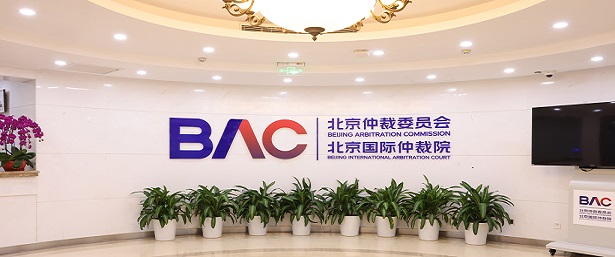
Publish time: Tue Aug 02 13:47:22 CST 2016
I. Dispute Resolution
(I) Arbitration cases
1. BAC accepted more cases in 2013, with a big rise in dispute amount
In 2013, BAC accepted 1,627 cases in total, with an increase of 154 cases over 2012; the dispute amount reached 12,040 million Yuan, with an increase of 5,740 million Yuan over 2012.
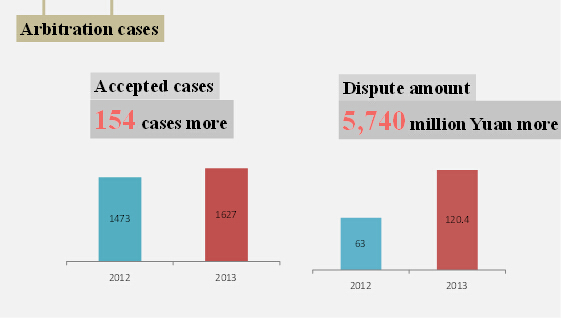
As to individual cases, cases with a small dispute amount decreased but cases with a large dispute amount increased greatly. There were 976 cases with a dispute amount less than 1 million Yuan whose total dispute amount reached 290 million Yuan, decreased by 112 cases and 30 million Yuan than 2012 respectively; there were 537 cases with a dispute amount more than 1 million Yuan but less than 10 million Yuan whose total dispute amount reached 1,730 million Yuan, increased by 172 cases and 510 million Yuan than 2012 respectively; there were 149 cases with a dispute amount more than 10 million Yuan but less than 100 million Yuan whose total dispute amount reached 4,270 million Yuan, increased by 54 cases and 1,510 million Yuan than 2012 respectively; there were 29 cases with a dispute amount more than 100 million Yuan whose total dispute amount reached 5,740 million Yuan, increased by 17 cases and 3,740 million Yuan than 2012 respectively.
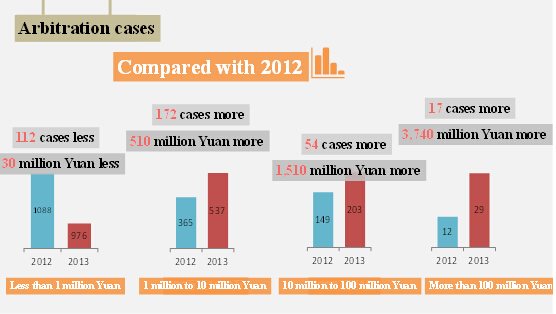
2. The types of cases remained the same, the number of international commercial arbitration cases increased than 2012, and the number of domestic cases involving the parties in other places increased continuously
As to the types of dispute, there were 428 disputes concerning sales contracts, accounting for 26.31% of all cases; there were 255 disputes concerning commission contracts, accounting for 15.67% of all cases; there were 346 disputes concerning contracts for construction projects, accounting for 21.27% of all cases; there were 186 disputes concerning investment & financing contracts, accounting for 11.43% of all cases; there were 109 disputes concerning lease contracts, accounting for 6.7% of all cases; there were 78 disputes concerning loan contracts, accounting for 4.79% of all cases; there were 43 disputes concerning new-type contracts in the franchise and tourism sectors, accounting for 2.64% of all cases; there were 37 disputes concerning contracts of hired work, accounting for 2.27% of all cases; there were 50 disputes concerning information networks, accounting for 3.07% of all cases; there were 26 disputes concerning technology contracts, accounting for 1.6% of all cases; there were 11 disputes concerning guarantee contracts, accounting for 0.68% of all cases; there were 17 intellectual property disputes, accounting for 1.04% of all cases; and there were 41 other disputes, accounting for 2.52% of all cases. Through the comparison with 2012, it can be seen that the numbers of disputes concerning sales contracts, contracts for construction projects, commission contracts, investment & financing contracts and lease contracts still were the top 5. BAC maintained the stability of cases in its traditionally advantageous fields, but should intensify its publicity in emerging markets so as to find new growth points.
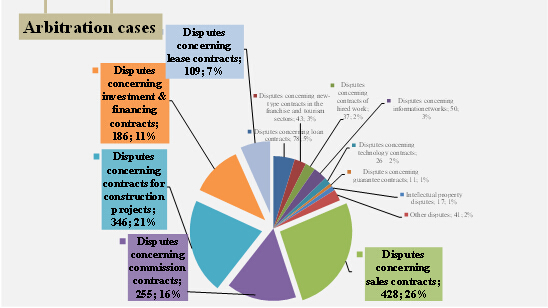
In 2013, BAC accepted 44 international commercial arbitration cases, accounting for 2.7% of all cases. Among domestic cases, there were 821 ones in which at least one party was in another place, accounting for more than a half (51.86%); there were 188 ones in which both parties were in other places, accounting for 11.88%. The domestic cases involved the parties in all provinces, municipalities and autonomous regions (there was no party in Tibet in 2012, but there was one party in Tibet in 2013). It shows that BAC has a gradually increasing influence and brand effect both at home and abroad.
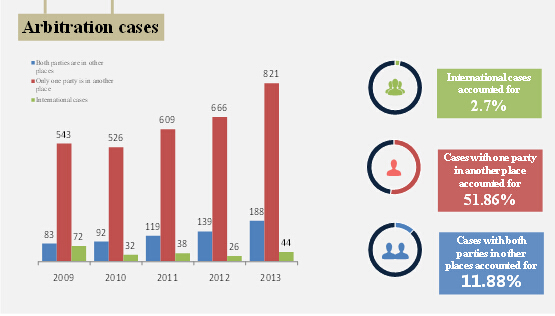
3. BAC maintained high rates of case conclusion and compromise as well as high case quality in 2013
BAC concluded 1,614 cases in 2013 with a rate of 99.2%, and the average duration of cases is 85 days. Among them, 826 cases were concluded by arbitral awards, accounting for 51.18%; 271 cased were concluded by mediation, accounting for 16.79%; 514 cases were withdrawn by the relevant parties, accounting for 31.84% (294 cases were withdrawn before the tribunal was formed, 81.8% cases were withdrawn after the tribunal was formed); 3 cases were canceled by BAC, accounting for 0.19%.
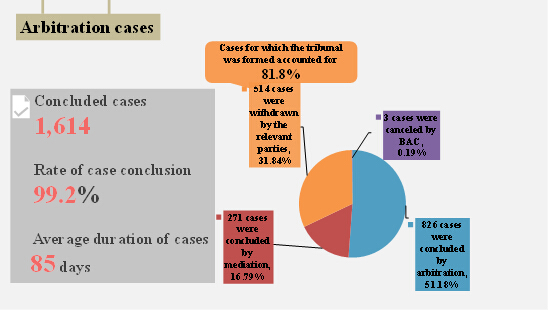
None of BAC’s arbitral awards were revoked by the courts in 2013; 2 arbitral awards of BAC were refused for enforcement by the courts, accounting for 0.12% of all concluded cases. Among these two cases, one involves the confirmation of the service of process; the other involves the insufficient principal evidence for ascertaining the facts. As the newly enacted Civil Procedure Law cancels “insufficient principal evidence for ascertaining the facts” as a cause of non-enforcement, the courts will be more prudent in executing the right of review, which is helpful for furthering reducing the number of non-enforceable cases. Generally speaking, only a few of BAC’s arbitral awards were revoked or refused for enforcement, this is not only because BAC has always attached importance to the standardization and professionalization in case handling and to the corresponding trainings, but also because BAC has always actively maintained exchanges and communications with the courts.
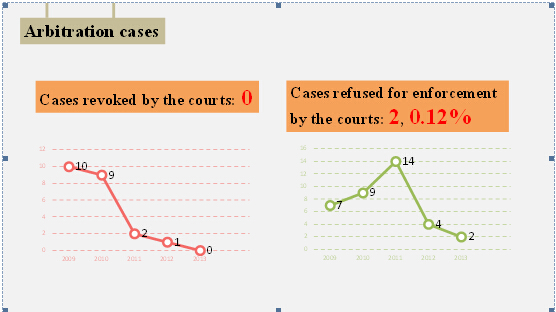
(II) Independent mediation
BAC’s Mediation Center aims at providing high-end commercial mediation services, introducing in international commercial mediation concepts, and promoting the professional development of commercial mediation in China. Therefore, the Mediation Center is focused on the following work:
1. The Mediation Center accepted 10 mediation cases with a total dispute amount of 420 million Yuan. All of these cases were concluded and 3 of them were concluded by successful mediation. A total of 6 secretaries participated in the handling of mediation cases.
2. With its endeavors in publicity and with the review of Beijing Higher People’s Court, the Mediation Center was listed in the 5 mediation organizations specially invited by the courts in Beijing to carry out the pre-litigation mediation for the courts at various levels in Beijing, and to carry out independent commercial mediation in accordance with their own mediation rules according to the courts’ entrustment. Till the end of 2013, the Mediation Center has successfully handled two mediation cases entrusted by Beijing Higher People’s Court.
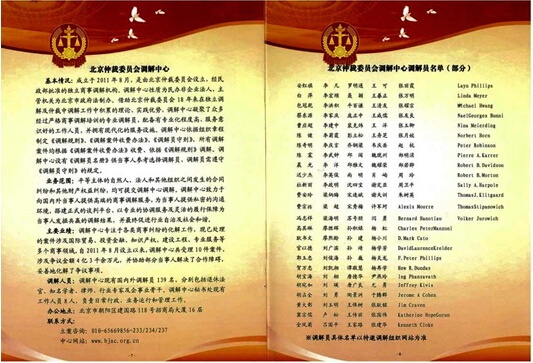
3. The Mediation Center, as the major initiator and leader, joined hands with 15 other dispute resolution and research institutions and established the Beijing Mediation Alliance, and held the 1st Beijing Mediation Forum, so as to form an unified organization for various mediation organizations, provide a good communication platform for social mediation institutions, and promote the healthy and rapid development of social mediation.
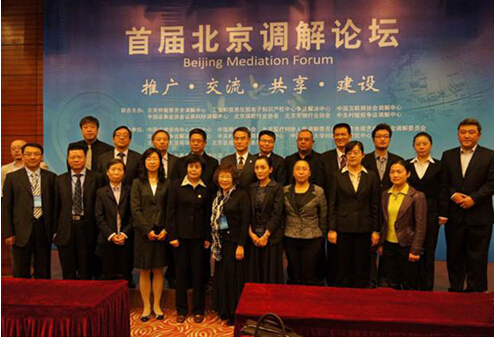
4. The Mediation Center improved the common format texts for mediation. Various format texts for mediation not only facilitate the process of mediation, but also reflect the Mediation Center’s level of performance as the key for winning the clients’ trust. Therefore, the Mediation Center modified and improved its format texts for mediation based on the practical experience of independent mediation cases, and achieved good results.
5. The Mediation Center developed its own mediation training courses and legal negotiation courses, and successfully introduced these courses to the relevant industrial associations, courts and higher education institutions, setting the foundation for popularizing the Mediation Center’s mediation concepts and experience. From February to July, the Mediation Center offered legal negotiation courses for a whole semester in Beijing Normal University; from September to October, the Mediation Center offered commercial mediation trainings to Insurance Association of China, China Banking Association, Securities Association of China and Beijing Higher People’s Court.
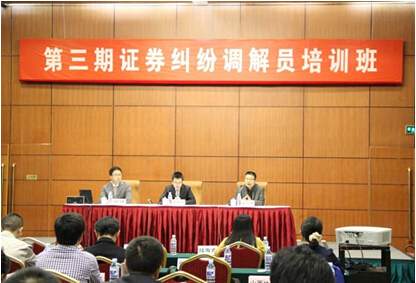
6. The Mediation Center resumed the mediation salons so as to cultivate the interest of arbitrators and mediators in the research and publicity of commercial mediation, and to take advantage of their efforts in the Mediation Center’s publicity, promotion and trainings. Two mediation salons were organized in 2013.
7. The Mediation Center delegated multiple experts including mediator CHEN Guang for the publicity of mediation to foreign dispute resolution institutions and companies.
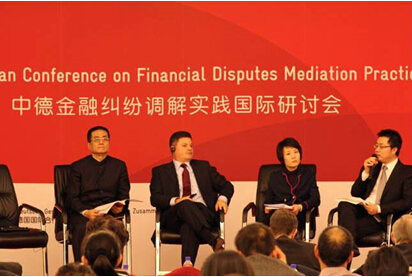
(III) Construction dispute review
After years of efforts, BAC achieved material progress in construction dispute review in 2013. BAC’s dispute review system was adopted by the contract between China TravelSky Holding Company and China Construction Eighth Engineering Division, with the reviewers (FENG Zhixiang, CHEN Qiming, YANG Hong), review agreement and review cost finalized after negotiations for months; the expert agreement and the cooperation agreement were officially signed on November 27, and CHEN Liangyu was recommended by BAC to act as the secretary of the Review Group.

Besides, BAC established a Dispute Review Training Group (YUAN Huazhi, ZHAO Hang, etc.). The Dispute Review Training Group drafted the dispute review training and promotion plan for the next year (the curriculum design had been confirmed); visited Wuhan Arbitration Commission to exchange the experience in promoting dispute review; visited a large construction company to introduce the characteristics and advantages of dispute review, and to recommend the trial application of dispute review in contracting and sub-contracting contracts.
II. Administration
(I) BAC’s revenue and tax payment
In 2013, BAC had revenue of 91,399,900 Yuan, and paid taxes of 18,032,700 Yuan. Till the end of 2013, BAC has accumulated paid taxes of 147.1 million Yuan, 33 times of the fiscal allocation upon its establishment.
The arbitrators’ remuneration was 29,685,700 Yuan in 2013, increased by 3,249,700 Yuan and 12.29% over 2012, and accounted for 46.24% of the arbitration revenue as to the accounting on accrual basis (current revenue /accrued or payable expenses).
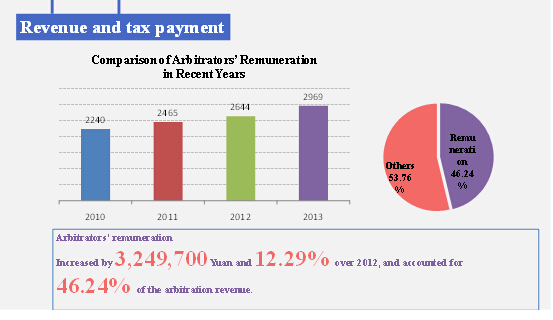
(II) Initiation of the modification of rules
BAC’s current Arbitration Rules were amended in 2007 and entered into force as of 2008. In the past 5 years, BAC enriched its arbitration practices, had deeper understanding of certain arbitration concepts, and made further consideration of certain issues. At the same time, the relevant parties, agents, courts for judicial review and BAC’s arbitrators raised some questions on the understanding and application of the current rules in the practice. Thus, the Arbitration Rules need to be further clarified and improved. In recent years, some famous arbitration institutions made characteristic and valuable modifications to their arbitration rules, such modifications can be used for reference. Therefore, BAC decided to initiate the modification and improvement of its Arbitration Rules. The basic ideas for the modification are as follows: 1. to further embody the concepts and features of commercial arbitration systems, to empower arbitration tribunals (arbitration institutions) with the jurisdiction for procedural progress, and to make the relevant parties really enjoy arbitration services with flexible procedures and high efficiency; 2. to better respect the free will of the relevant parties, to enhance the transparency and predictability of arbitration process, to improve the contents of rules and procedural provisions, and to facilitate the understanding and application of the relevant parties; 3. to learn from good international arbitration experience and practices to the greatest extent, to further improve the international arbitration procedures, and to highlight the internationalization feature of the Arbitration Rules.
A rather mature draft of the new Arbitration Rules was formed after several rounds of opinions solicitation. Next, BAC will solicit the opinions of more stakeholders to perfect the new rules; BAC will also discuss with arbitrators on the understanding and application of new rules, and welcome the participation of all arbitrators.
(III) Organization of symposia to solicit the opinions and suggestions of arbitrators
According to the progress of the re-election of BAC’s Committee, BAC held 5 symposia with arbitrators on July 31, August 7, August 14, August 21 and August 28 of 2013 respectively, inviting 36 arbitrators in 5 groups (ex-judges; state functionaries for legislation, law enforcement and legal affairs; professionals in economy and trade; lawyers; legal researchers and teachers) to put forward suggestions on such aspects as improving the work of secretaries, enhancing the quality of awards and promoting the development of arbitration.
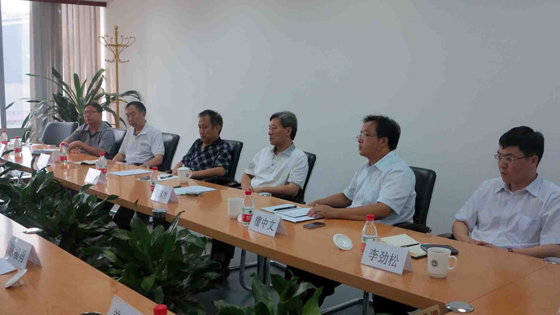
(IV) Improvement of the arbitrator appointment mechanism
Based on the training and assessment of arbitrators in the past years and according to the feedback of secretaries and the relevant parties, BAC made a comprehensive classification of all arbitrators according to specialties and industries, and established an information base for reference upon the appointment of arbitrators. BAC also carried out regular analysis and research of arbitrator appointment.
In 2013, a total of 267 arbitrators participated in case handling. Firstly, a high proportion of BAC’s arbitrators participated in case handling. BAC appointed arbitrators for a total of 1,622 person times; among which, presiding arbitrator for 518 person times, sole arbitrator for 784 person times, first arbitrator for 112 person times, second arbitrator for 208 person times. A total of 225 arbitrators were appointed[1]. Secondly, there are less appointments of an arbitrator for one party. With the development of arbitration in recent years, the legal consciousness of the relevant parties has been enhanced, and there is a sharp decrease in the practice that neither party nominates its arbitrator. Among the 526 cases for ordinary procedure in which a tribunal was formed, 79% claimants nominated arbitrators and 60% respondents nominated arbitrators. Objectively speaking, BAC now has increasingly less opportunity to appoint an arbitrator for one party. Thirdly, new arbitrators got sufficient practice opportunities, 57 of BAC’s newly employed arbitrators actually participated in case handling, accounting for 98% (only 1 arbitrator has not participated in case handling).
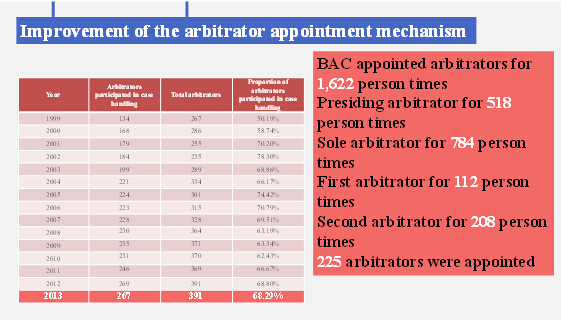
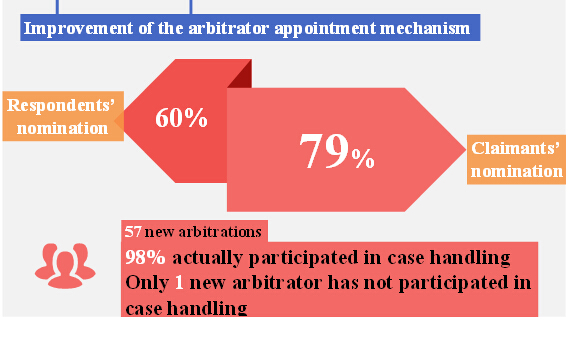
(V) Enhanced communication and exchange with the courts
First, communication and exchange with the 3rd Civil Adjudication Tribunal of Beijing No. 2 Intermediary People’s Court: On May 19, 2013, BAC and the 3rd Civil Adjudication Tribunal of Beijing No. 2 Intermediary People’s Court jointly held the “Exchange Meeting on Judicial Review”, so as to make a summarization and analysis of the judicial review work in 2012 and to exchange opinions on certain issues.
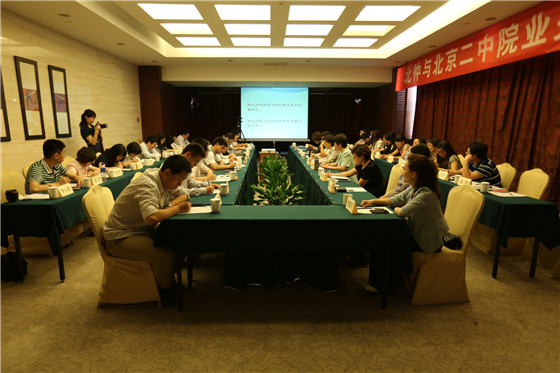
Second, communication and exchange with the 3rd Civil Adjudication Tribunal of Beijing No. 3 Intermediary People’s Court: After the competent authority for judicial supervision of BAC was changed to be the 3rd Civil Adjudication Tribunal of Beijing No. 3 Intermediary People’s Court, BAC had active communication and exchange with it in terms of personnel and business, so as to accelerate its understanding and acquaintance of arbitration. On October 17, 2013, BAC and the 3rd Civil Adjudication Tribunal of Beijing No. 3 Intermediary People’s Court jointly held the “Symposium on the Trial of Cases Involving Arbitration”, both sides expanded their consensus and deepened the mutual understanding through the discussion on such issues as the principles, concepts, standards and procedures of judicial review. After the symposium, BAC began to implement the Judicial Supervision Information Summarization and Internal Circulation System, so as to facilitate the timely communication and exchange of the judicial review information.
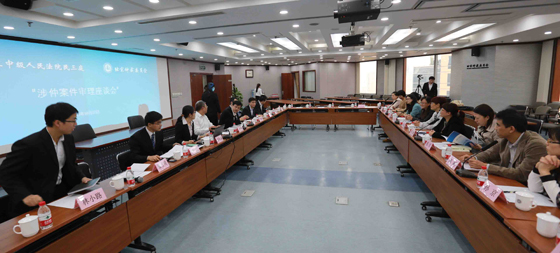
Third, on April 17, 2013, BAC, the Enforcement Bureau of Beijing No. 1 Intermediary People’s Court and the Enforcement Bureau of Beijing No. 2 Intermediary People’s Court jointly held a symposium themed “Enforcement of Arbitration Cases & Comprehension of Causes for Non-enforcement in the New Civil Procedure Law”, the three sides exchanged opinions on the enforcement of arbitral awards in 2012 and on the existing problems, and discussed the modifications to non-enforcement clauses in the new Civil Procedure Law.
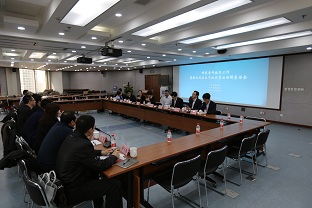
Fourth, the exchange with Beijing Higher People’s Court: BAC promoted Beijing Higher People’s Court to adopt the guiding opinions on judicial supervision and the internal reporting system for revocation of domestic awards; invited Presiding Judge LIU Chunmei of the 2nd Civil Adjudication Tribunal of Beijing Higher People’s Court to be a lecturer of the Arbitrators’ Salons and interpret the guiding opinions of Beijing Higher People’s Court on judicial supervision.
Through the above communication and exchange activities, BAC enhanced the mutual understanding with the courts and called for the courts to respect the features and rules of arbitration, so as to create a good judicial environment for the development of arbitration.
(VI) Arbitrator-related work
First, the continuation of arbitrators’ salons. From the beginning of this year till present, BAC has successfully organized 11 arbitrators’ salons; the discussion topics covered such fields as model contract texts for construction projects, trust, real estate finance, international arbitration, judicial review and resolution of disputes concerning lease contracts. Each salon attracted about 100 participants, including 40-60 arbitrators. In the first half of 2013, the most salons were organized by the secretaries for case-filing; in the second half, BAC tried a new manner and combined the salons with the internship program, i.e. a salon is organized by a secretary for case-handling with one intern be responsible for routine affairs. Till present, a total of 9 secretaries have participated in the organization work, including 2 secretaries for case-filing. The Third Secretariat recommended the topics and lecturers of 3 arbitrators’ salons. At the same time, BAC drafted amendments to rules of the arbitrators’ salon after soliciting the opinions of front-line staff members, and will soliciting the opinions of leaders and other staff members. Besides, BAC is now sorting out the historical data of arbitrators’ salons, and will soon produce an information database on the topics and lecturers of arbitrators’ salons.
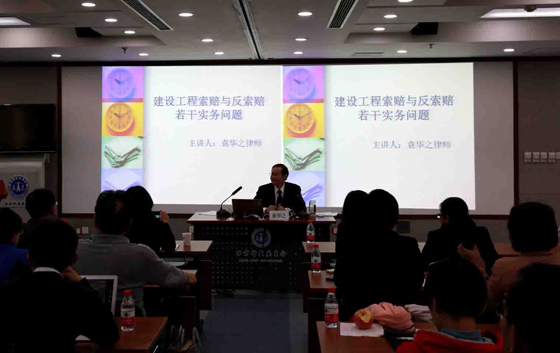
Second, the organization of diversified professional salon groups. BAC successfully organized 13 events for the professional salon groups of arbitrators, covering such fields as construction projects, real estate, intellectual property, air law, cultural media, finance, company law and mediation, attracting the participation of 500 person times. These events include 2 for the professional salon group on construction projects, 3 for the professional salon group on intellectual property; 2 for the professional salon group on air law, 1 for the professional salon group on cultural media; 2 for the professional salon group on finance, 2 for the professional salon group on mediation and 1 for the professional salon group on company law.
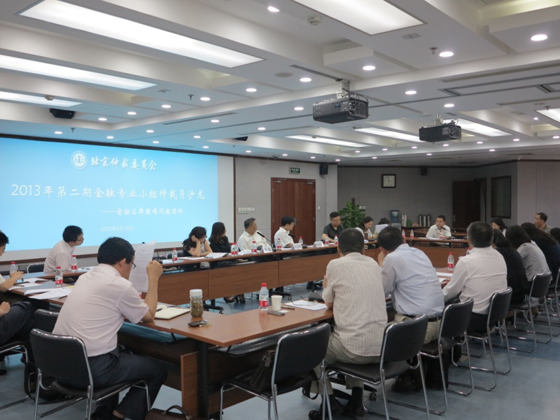
Third, the continuation of training classes for arbitrator applicants. BAC successively organized the 14th and the 15th training classes for arbitrators in May and November of 2013, attracting a total of 110 participants. The recommendation of new arbitrators has been finished based on these trainings.
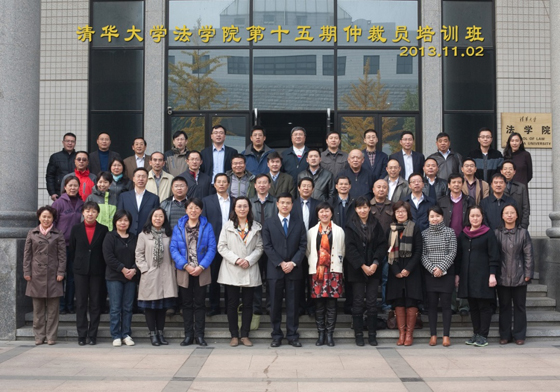
III. Research
(I) Exploration on the establishment of research system
1. Compilation of the first annual dispute resolution review report
For the first time, BAC organized experts of the arbitration sector to compile the Commercial Dispute Resolution in China: An Annual Review and Preview (2013) (Chinese & English), covering the 5 fields of commercial arbitration, commercial mediation, construction projects, finance and intellectual property in more than 190,000 Chinese characters. The report made a panorama review of the commercial dispute resolution in China in 2012 and made a preview of 2013. Its English version was released at the London Summit on Commercial Dispute Resolution in China, attracting the comments from several Lord Chancellors and famous politicians in the UK. The summit was attended by experts and scholars from prestigious higher education institutions, senior partners from top law firms both at home and abroad as well as several Queen’s Counsels, who made an in-depth discussion on the status quo of dispute resolution in China. The report’s Chinese version was released in Beijing soon after, attracting the presence and comments of dozens of experts and scholars from the courts at various levels including the Supreme People’s Court, finance industry associations and famous higher education institutions. At present, BAC is the only arbitration institution in China to release the annual dispute resolution review report.

2. Implementation of the BAC Scientific Research Fund program
Focusing on the meticulous and in-depth research of individual procedural and substantial issues in civil and commercial arbitration, the BAC Scientific Research Fund aims at supporting BAC’s researches with significant academic meanings and application prospects based on diversified dispute resolution practices, and using the relevant research results in BAC’s case handing and publicity.
2013 is the first year for the implementation of the BAC Scientific Research Fund program, BAC received 31 applications involving 19 research topics, and finally decided to finance 18 applications involving 14 research topics. BAC has allocated more than 200,000 Yuan as financial subsidy.
3. Implementation of the BAC Book Collections program
BAC initiated the BAC Book Collections program in 2013. The main aims of the program are promoting the development of diversified dispute resolution mechanisms in China, encouraging personages of all circles to engage in the research on diversified dispute resolution mechanisms, and acting as a platform to display the research level of China on diversified dispute resolution mechanisms. Unlike the BAC Scientific Research Fund, the BAC Book Collections program covers broader and more comprehensive research contents, extending from the research on BAC’s prospective and practical issues to the research on the creation and development of a dispute resolution system that can benefit the whole country. The program embodies BAC’s ambitious goal of promoting the development of social dispute resolution mechanisms. At presents, BAC has received 11 applications for the BAC Book Collections program, and is going on with the following steps.
4. Implementation of the BAC Translation Series program
Compared with the BAC Book Collections program, the BAC Translation Series program tries to introduce the innovative practices and academic researches related to diversified dispute resolution outside China. It aims at setting up a platform for the exchange between China and foreign countries on dispute resolution, urging the Chinese practitioners to learn from advanced experience in foreign countries, and promoting the development of dispute resolution mechanisms in China. The program also embodies BAC’s ambitious goal of promoting the development of social dispute resolution mechanisms.
In 2013, BAC published one book of the BAC Translation Series – Who Gets What: Fair Compensation After Tragedy and Financial Upheaval, a translation of about 150,000 Chinese characters. The translators are XU Jie, SUN Wei, GUO Chao and WU Wendi, all of whom are BAC’s secretaries who have studied abroad. Besides, BAC has received 10 applications for the program, and is going on with the work of confirming the copyright.
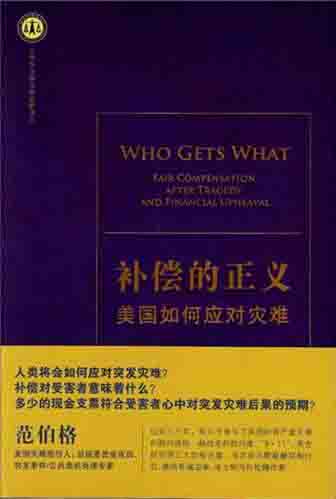
5. Reform of the Beijing Arbitration Quarterly program
As an old and traditional platform, Beijing Arbitration Quarterly is well-known to the arbitration sector both at home and abroad, and has realized mature development. However, there is still a big gap between it and famous arbitration periodicals in the world. Therefore, BAC reformed the Beijing Arbitration Quarterly program at the beginning of 2013: the Editorial Board was reorganized by introducing in world famous personages of the arbitration sector; the Editorial Department was reformed by absorbing young and energetic colleagues; and the relevant requirements on facilitating overseas publicity were put forward. At the same time, the Editorial Department reached agreements with www.cqvip.com and Wells, so that the articles of Beijing Arbitration Quarterly can be included in www.cqvip.com and www.pkulaw.cn in full text.
In 2013, BAC published four issues of Beijing Arbitration Quarterly with about 550,000 Chinese characters, including 32 articles from 39 authors on the four categories of Annual Review Report, Construction Projects, Arbitration & Mediation and Intellectual Property.
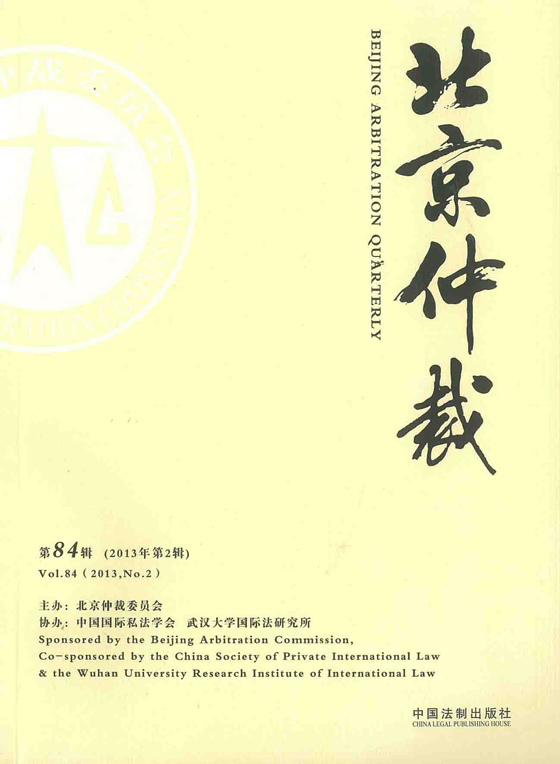
6. Enhanced support in books, data and other resources
BAC sorted out its collection of published periodicals (paper mold) (51 types); purchased 525 new Chinese books and 185 new English books; downloaded 4 types of periodicals with a total of 2,281 theses, covering all famous arbitration periodicals in the world; renewed the subscription of 6 domestic and foreign databases; set up a special area for books donated by arbitrators, receiving 25 donated books.
BAC made rapid progress and achieved good results in the establishment of public research platforms. BAC’s public research platforms have formed their core framework and multi-level research approaches, which is good for the successful development of BAC’s researches. We also encountered four difficulties in the practice: the difficulty of finding excellent research topics and talents; the difficulty of selecting excellent research topics and talents; the difficulty of creating attractions to research topics and talents; the difficulty of ensuring the smooth progress of various research projects which were still in the start-up stage. Therefore, we will give more consideration to overcoming these difficulties in the following work, and accumulate more experience, so as to ensure the long-term and effective operation of each platform.
(II) Strengthened researches on special topics
In the financial field, we carried out specialized discussions on hot spot issues such as the practice of personal loans from banks, knotty problems in the financial industry and VIE. BAC also expressed its opinions in several documents with guiding significance and technical content, such as the Referential Opinions on the Practice of Personal Loans from Banks, the Collection of Legal Norms Related to VIE, the Minutes of Symposia on the Prevention of VIE Risks and the Minutes of Discussion Meetings on Knotty Problems in Financial Laws.
In the Internet field, BAC implemented the program of Research on Alternative Dispute Resolution Mechanisms for the Internet together with the Electronic Intellectual Property Center, Ministry of Industry and Information Technology. Through the questionnaires to more than 100 Internet companies and the field survey of some representative Internet companies, we analyzed the characteristics of disputes and the choice of dispute resolution manners in the Internet sector, and put forward targeted opinions on the application and development of alternative dispute resolution in the Internet sector. The research report of the program is being finalized.
In the cultural media field, BAC’s arbitrators set up a cultural media group with the tenet of enhancing the understanding of cultural media and realizing better publicity of arbitration in the cultural media sector. At present, we are producing a CD named “Legal Practice in the Resolution of Disputes Related to Film & TV Products” in cooperation with some industrial associations including Beijing Film & TV Artists Association and China Television Production Committee, and are summarizing model contract texts, cases, laws and regulations related to the screen culture sector, so as to facilitate the resolution of disputes in more professional manners.
In the aviation field, BAC held the Inauguration Ceremony & First Meeting of the Air Law Research Group on January 30, 2013, inviting experts of the air law to discuss the resolution of disputes in the aviation field through arbitration. The Air Law Research Group held a special event on September 25, 2013 – a training themed “Several Legal Issues in the General Aviation and Corporate Aircraft Market”, which was attended by more than 100 professionals and lawyers from airlines, aircraft manufacturers and insurance companies.
BAC made a comprehensive survey of Beijing enterprises on commercial arbitration: it organized a meeting of the research group, which was attended by more than 10 government agencies; it designed the questionnaire and the survey scheme; it collected the information about more than 70,000 surveyed enterprises; and the survey has begun to be implemented. Beijing Municipal State-owned Assets Supervision and Administration Commission and Beijing Municipal Commission of Housing and Urban-Rural Development are responsible for the distribution and collection of questionnaires within their respective jurisdiction, while BAC is responsible for the written survey of enterprises with a registered capital of more than 50 million Yuan. The questionnaires are being distributed, and the survey is predicted to achieve results at the beginning of 2014.
BAC cooperated with Beijing Municipal Commission of Commerce on the research of establishing an International Commercial Arbitration Center. BAC finished a draft written report in June and submitted it to Beijing Municipal Commission of Commerce for review, and provided supplementary data in September and October.
(III) Solidification of research results
1. The printing of the Excellent Arbitral Awards Selection was completed in December.
2. The Re-arbitration Awards Collection. It is about 500,000 Chinese characters and was printed by BAC for internal circulation, including all 29 re-arbitration cases required by the court since BAC’s establishment in 1995 till December 31, 2013 with the court’s Re-arbitration Notice, the original Arbitral Award and the Re-arbitration Award for each case.
3. BAC provided data for and participated in compiling the Progress Report on the Rule of Law in Beijing, and published an article themed Feasibility Study on the Establishment of An International Arbitration Center in Beijing.
4. The Summary of Seminars. The transcript of all sound recordings has been finished and sent to all lecturers for verification at the beginning of 2013, and we are now waiting for their replies.
5. The Collected Works of Arbitration Salons. We are now collecting and summarizing the primary data, and will finish the analysis and planning work in 2013.
6. The transcript templates for hearings. We summed up and analyzed the transcripts in different formats and with different contents, formed a research report, and recommended transcript templates for the use by secretaries, so as to realize the normalization and standardization of the note-taking procedure to the greatest extent.
7. BAC completed the summarization and analysis of judicial review in 2012.
8. BAC completed the summarization and analysis of non-enforcement in 2012.
9. BAC completed the analysis of causes for non-enforcement in the new Civil Procedure Law.
10. BAC completed the information and award collection for cases related to public relation and consultation.
11. BAC completed the information and award collection for cases related to franchise.
12. BAC completed the information and award collection for cases related to film & TV products.
13. BAC completed the information and award collection for cases in the aviation sector.
14. BAC cooperated with Beijing Municipal State-owned Assets Supervision and Administration Commission in the compilation of typical cases collection organized by the latter, and provided the latter with 8 articles on case analysis.
15. BAC collected civil rulings on the validity of arbitration agreements and completed their classification and conversion into electronic edition, the text has been proofread for three times and will be included in the Manual for Arbitrators.
16. BAC completed the Interim Awards Collection.
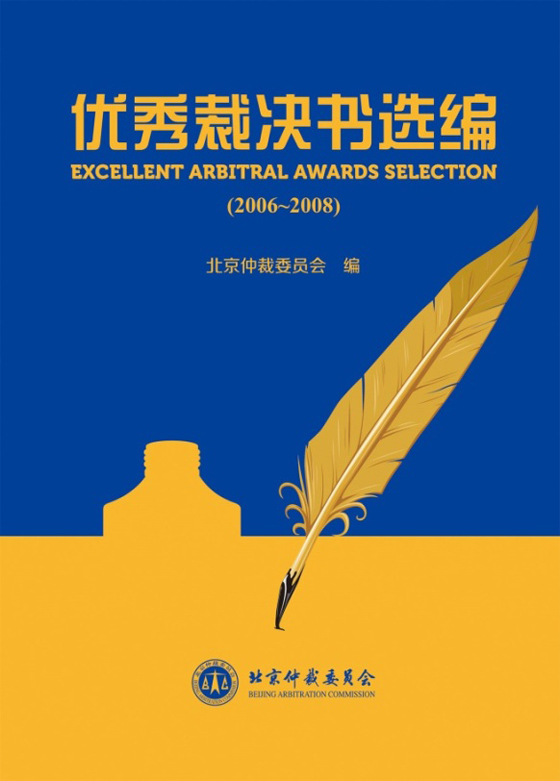
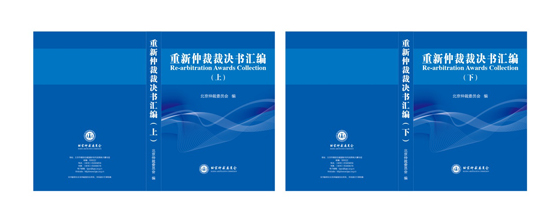
IV. Publicity
In this era of information explosion, the clients spend less time on the specific information and on the specific channel. In order to maintain the publicity effect, we must innovate our publicity means, expand our publicity channels and realize a comprehensive layout of publicity approaches. Therefore, BAC adopted multiple publicity means including writings, e-mails, conferences, exhibitions and videos; and formed unified, diversified and complementary publicity channels with the combination of printed media and electronic media, including the Legal Daily, the Corporate Legal Affairs, the Commercial Law, Lexis, Wolters Kluwer, www.bookan.com.cn, www.cqvip.com, the BAC Newsletter and the Beijing Arbitration Quarterly. At the same time, BAC integrated and reformed various publicity channels to realize the publicity with uniform goals, hierarchical classification and popularity both at home and abroad. The major publicity efforts in 2013 include:
(I) To improve BAC’s publicity capability and strength through multiple forms of activities
1. BAC organized or participated in more than 30 professional trainings related to arbitration and dispute resolution, which were attended by participants of more than 7,000 person times.
BAC participated in 13 legal trainings for labor-dispatching enterprises in Beijing organized by the Construction Industry Management Center, which were attended by more than 4,000 participants; participated in the revision of measures for the management of general contractors organized by the Market Division; BAC promoted the development of mechanisms for rapid resolution of labor-related disputes, strengthened the feedback of case handling process, and established the information sharing and circulation system, with 2 cases concluded in 2013 and 1 case undergoing identification; BAC negotiated with the Market Division about the trainings on new model texts and is drafting the teaching materials; BAC held two communication and exchange meetings with the persons in charge of various divisions of Beijing Municipal Commission of Housing and Urban-Rural Development. BAC organized 4 trainings for Constructors in the first half of 2013. BAC organized the training of mock arbitration tribunal for Beijing Municipal Bureau of Financial Work, which was attended by more than 80 participants. BAC organized a training for an insurance company, which was attended by more than 30 management staff. BAC organized three legal trainings on commercial arbitration for China TV Play Producers Association, which were attended by more than 400 participants.
2. BAC organized more than 10 forums
BAC organized the Forum on Financial Legal Practice for 2 successive years, covering the three fields of banking, securities and insurance. 27 experts were invited to give speeches on these forums, which were attended by more than 500 participants. The forum has become a brand forum of BAC and a window for BAC’s publicity in the finance sector. BAC will continue to hold the forum next year. BAC successfully organized the In-house Counsel Forum in 2013, which is a platform for the exchange between in-house counsels and BAC. BAC also organized 9 lectures on the management of construction projects in collaboration with other organizations.
3. BAC produced its publicity brochure and video
BAC established a publicity brochure production group, which finished producing the first version of the publicity brochure in 6 months. 2,000 copies of the brochure was printed and distribution, and achieved good results. The group finished producing the second version of the publicity brochure in 9 months, and 30,000 copies were printed.
In November, BAC started the production of its publicity video.
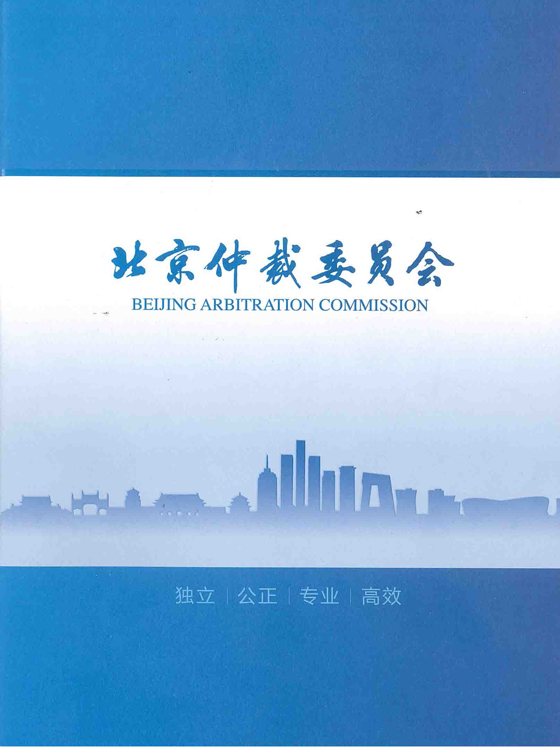
4. BAC strengthen the information release in the Internet
BAC adopted measures for optimizing the flow of editors in 2013 as well as timely upgraded and adjusted the target audience, so as to realize the targeted release of BAC Newsletter with richer contents and better quality. By the December, 6 issues of the BAC Newsletter were released in 2013, including 13 articles and notices in the “Comment” and “Focus” columns, nearly 100 pieces of news both at home and abroad, and about 50 articles on the introduction of the relevant laws and regulations. The BAC Newsletter is sent to more than 1,000 audiences through e-mail, and is also released on BAC’s official website.
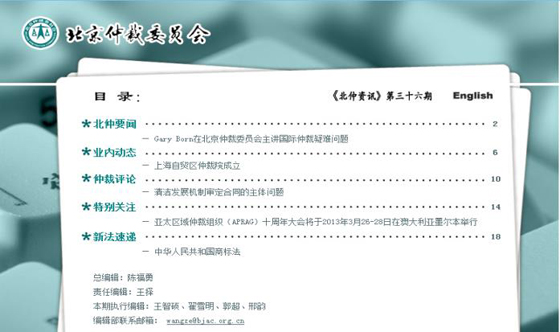
In November, BAC had its WeChat public account, provided a large amount of information about BAC’s work to mobile clients, won more than 400 fans, and attracting more and more audience.
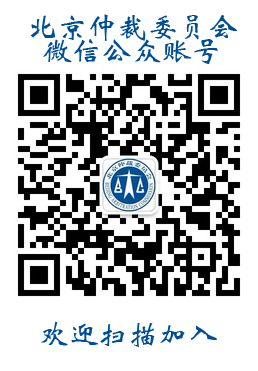
5. BAC participated in the China Beijing International Fair for Trade in Services, distributed more than 200 publicity brochures, accepted the inquiries, communicated and discussed cooperation prospects with law firms and Shanghai Mediation Center, and discussed with the American Society of International Law on future cooperation.
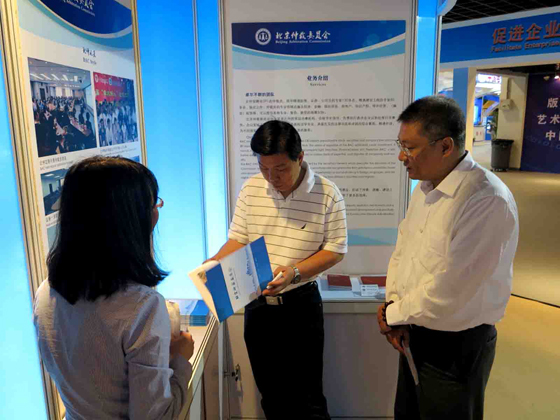
6. BAC visited or accepted the visits of more than 20 large enterprise groups
BAC visited some large enterprises and carefully inquired their demands, which enhanced the communication and mutual understanding between BAC and these enterprises. BAC also prepared documents about its cases related to these enterprises and their industries, and gave such documents to these enterprises as gifts after the corresponding technical processing, which was welcomed by them. BAC visited several group companies, and formed written summaries and analysis reports of these visits. BAC visited China Commercial Real Estate Association; participated in the 2013 Annual Conference on Commercial Real Estate and distributed more than 300 BAC’s publicity leaflets; sorted out BAC’s cases related to commercial real estate, and gave an interview to a magazine on commercial real estate; visited a senior management staff of a hotel to discuss the cooperation on dispute resolution related to hotel management contracts; and visited a group company on public relations to have a better knowledge about the development of public relations and consultation industry and its demand for dispute resolution.
Reception of visitors: BAC received visitors from China Banking Association and several financial companies; negotiated about future cooperation with visitors from nine real estate companies; received visitors from several group enterprises in the military industry; joined the research group on enterprise-related case management, and assisted the Corporate Legal Affairs Management Research Center, China University of Political Science and Law (CUPL) to organize seminars on case management for the Internet industry and on technologies and skills for handling enterprise-related cases; and participated in the China Corporate Legal Affairs Conference.
7. BAC held the first “BAC Cup” contest of articles on commercial arbitration by students of higher education institutions, which was a great success with the support and help of arbitrator tutors. The contest expanded the influence of commercial arbitration in higher education institutions, and is helpful for attracting the students’ attention to the research on commercial arbitration.
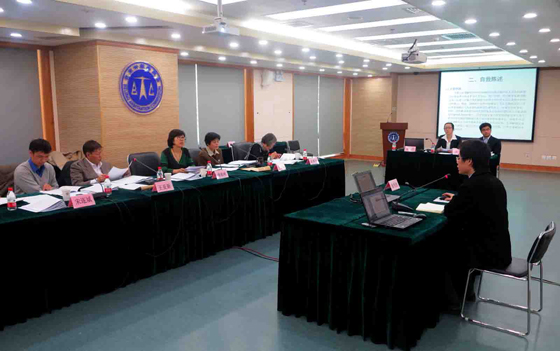
(II) To promote BAC’s influence by working closely with the media
In 2013, BAC released 13 articles, 11 pieces of news and 3 advertisements in the media including the Legal Daily, the Commercial Law, the Corporate Legal Affairs, the Modern Bankers, the Construction Times and the Construction Economics.
1. The special column in the Commercial Law
The Commercial Law has a special column on dispute resolution, BAC contributed a total of 10 articles to the special column in 2013 (the articles for the special column are generally contributed by famous dispute resolution institutions such as SIAC and HKIAC or famous law firms in Asia). These articles were written by more than 10 arbitrators and case-handling secretaries of BAC and included such contents as the introduction of BAC’s new rules, the survey of BAC’s cases related to construction projects, public relations, consultation, financial investment and foreign parties, the recommendation of joint mediation and the analysis of major cases.
BAC’s Vice Chairperson WANG Hongsong contributed an article themed “BAC Chief Sets Direction for Future Strategy” on invitation to the September Issue of the Commercial Law (a special issue containing the exclusive interview of the Secretary of Justice of Hong Kong S.A.R.), making a comprehensive introduction of BAC’s latest developments to the whole world. The Commercial Law introduced the prospect of China’s arbitration market in the September Issue, and especially mentioned BAC’s increasing caseload and new rules. Besides, the Commercial Law highlighted BAC’s scholarship in Pepperdine University in the highlights of the May Issue. BAC also had a publicity page in the July, August and September issues, achieving good advertising effect.
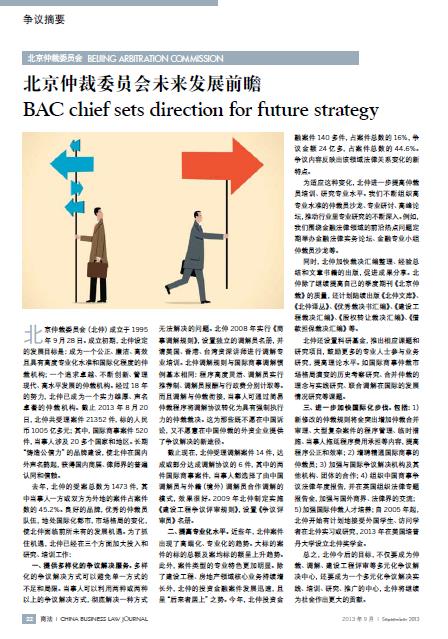
2. The close cooperation between BAC and the Corporate Legal Affairs. The Corporate Legal Affairs is attractive to in-house counsels and lawyers related to corporate legal affairs. BAC continued its cooperation with the Corporate Legal Affairs in 2013, and had a special column on dispute resolution, which made a complete and comprehensive introduction of BAC’s new rules and especially reported BAC’s meetings related to corporate legal affairs.
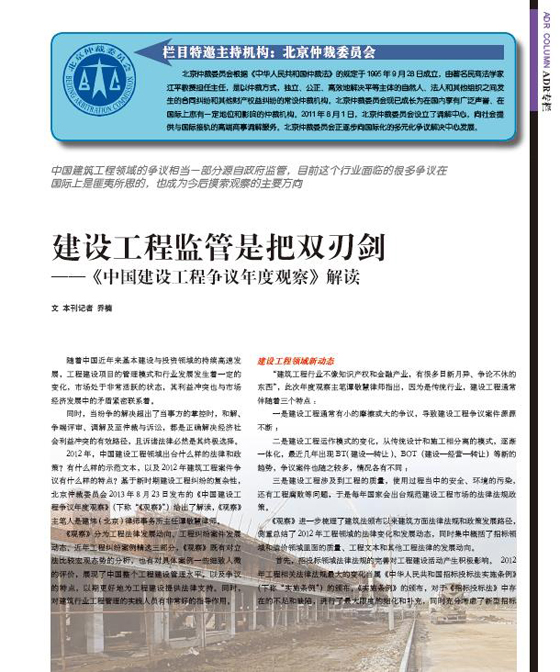
3. BAC signed an agreement with www.cqvip.com. All articles of the Beijing Arbitration Quarterly since its publication will be included in the database of www.cqvip.com.
4. BAC continued its cooperation with www.bookan.com.cn. BAC renewed its entrustment to www.bookan.com.cn for releasing the digital version of the Beijing Arbitration Quarterly.
(III) To intensify the publicity in key fields by strengthening the cooperation with the relevant research institutions and associations
1. In August of 2013, BAC and China Banking Association entered into a framework agreement on strategic cooperation and held a signing ceremony, both parties reached a consensus on their extensive cooperation in arbitration and mediation cases, research and publicity. BAC also organized a training on diversified resolution manners for bank-related disputes for China Banking Association.
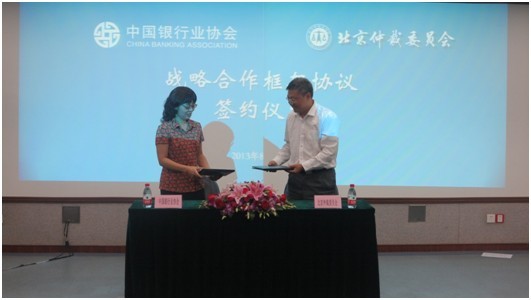
2. After years of close cooperation, BAC and the Securities Association of China entered into a framework agreement on strategic cooperation and held a signing ceremony in November of 2013, both parties reached a consensus on their extensive cooperation in arbitration and mediation cases, research and publicity. BAC’s Mediation Center also organized a special training of mediators for the Securities Association of China, and attended the international seminar on the practice of China and German in the mediation of financial disputes organized by the Securities Association of China.

3. BAC’s cooperation with Beijing Construction Association: both sides began their contacts in the first half of 2013, and are discussion the plan for their specific cooperation in the trainings for construction enterprises and the mediation in cases related to construction projects.
4. BAC’s cooperation with China Engineering Cost Association: both sides jointly held the conference to publicize regulations on authentication of engineering cost (in Chongqing); both sides jointly promoted the legislation on authentication of engineering cost; BAC participated in the compilation of teaching materials for further education on audit and authentication of engineering cost.
5. BAC’s cooperation with China Exploration & Design Association (CEDA): BAC received the visit of CEDA Secretary General XU Jinping in February; invited CEDA’s representatives to participate in seminars on joint construction management; collected CEDA’s legal problems in the design field; contributed articles to a special column on engineering law in the Intelligent Building & City Information; and introduced the advantages of arbitration for the resolution of disputes related to construction projects in the Annual Conference on Intelligent Buildings in China at the end of December.
6. BAC’s communication and exchange with lawyers associations
(1) On June 20, 2013, BAC and Beijing Lawyers Association (BLA) jointly held the “Professionalism for Brand, Cooperation for Win-win – Symposium on Strengthening the Professional Cooperation between BAC and BLA’s Special Committees”, BAC’s representative exchanged opinions with the persons in charge of BLA’s Special Committees.
(2) BAC and Beijing Chaoyang District Lawyers Association entered into a Framework Agreement on Strategic Cooperation, and held a signing ceremony and the first training of lawyers on July 12, 2013. This cooperation is good for improving the lawyers’ performance as entrusted agents in arbitration and publicizing commercial arbitration in lawyers. Both sides jointly held trainings in BAC on October 25 and December 19, 2013 successively.

(3) On July 27, 2013, BAC’s Division Chief JIANG Qiuju gave a lecture on “Commercial Arbitration Practice” in the “Growth in Sunshine – Training of Young Lawyers” organized by BLA’s Young Lawyers Committee, which was greatly welcomed by a lot of young lawyers.
(4) BAC’s new lawyer training program. BAC reformed its new lawyer training program in the following aspects: Firstly, the trainings were jointly undertaken by all of BAC’s divisions, which is good for the promotion in respective specialties; secondly, the design of cases for training was improved to cover all specialties so as to display BAC’s extensive capability in the resolution of various disputes. By the end of 2013, BAC organized 6 trainings for more than 1,000 new lawyers, with cases covering such fields as finance, foreign-related disputes, construction projects and intellectual property.
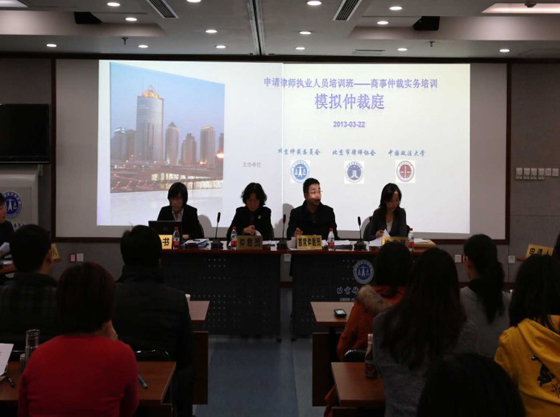
7. In-house counsels are the core force for the management of legal affairs in various enterprises, they often determine the choice of enterprises in dispute resolution manners and are even decision-makers in this aspect. Therefore, BAC must maintain and further its close contacts and cooperation with in-house counsels so as to ensure that a certain amount of enterprises take BAC as the top choice for dispute resolution. As in-house counsels of different enterprises usually deals with different fields of legal affairs, BAC must find the bonding points with them so as to make BAC’s publicity extend to as many of them as possible. For this purpose, BAC carried out close cooperation and entered into a framework cooperation agreement with the Corporate Legal Affairs Management Research Center, CUPL, both sides reached a consensus on their cooperation in publicity, conferences and trainings.
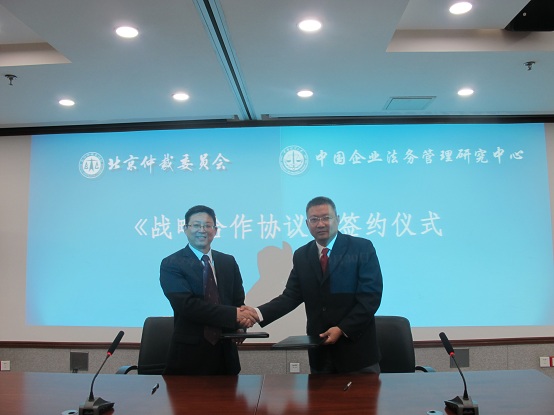
8. BAC established a long-term cooperation relationship and jointly established a forum on practices of financial law with the Financial Arbitration and Mediation Research Center, Central University of Finance and Economics, so as to realize the real-time resource and information sharing in the resolution of financial disputes. Besides, BAC also tried to contact the China Financial Leasing 30 Forum, and both sides reached a fundamental intention on further contacts and cooperation.
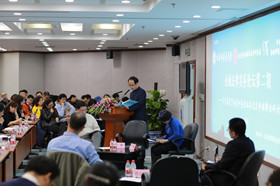
V. International Contacts
Compared with the domestic cooperation, BAC’s international contacts are still in the early stage. However, BAC has won certain reputation in the world and has dealt with important international cases attracting extensive attention of the international arbitration circle. To our gratification, BAC handled 8 cases in English in 2003, realizing a breakthrough. In order to shorten the gap with top international arbitration institutions and make BAC better known by clients both at home and abroad, we rendered great efforts in the fundamental data research and paid more attention to the extensive publicity.
(I) Foreign Affairs Group
BAC set up a Foreign Affairs Group to be specially responsible for dealing with BAC’s foreign affairs.
(II) Case handling in English
In 2013, BAC handled 8 cases with English as the language of arbitration, realizing a breakthrough and testing BAC’s level of internationalization. BAC took advantage of this opportunity to modify and improve its English model texts, so as to make them accord to BAC’s practical situation and comply with international standards on commercial arbitration. Besides, BAC made further exploration on methods and manners for the management of cases using English, so as to showcase BAC’s high level in case handling.
(III) Organization of or participation in more than 30 foreign-related events
The clients at home and abroad have insufficient knowledge about BAC’s foreign-related business due to historical reasons. Therefore, a key strategy of BAC’s publicity is to participate in various international arbitration events, to establish relationships with international arbitration institutions and law firms, with higher education institutions in foreign countries and with foreign scholars, so as to increase BAC’s international exposure and change the concepts and mindset of various personages, the relevant parties and the arbitration circle about BAC.
When attending the APRAG Conference 2013, BAC’s Deputy Secretary-General CHEN Fuyong was elected Vice President of the next APRAG Committee and delivered a keynote speech themed “A Statistical Assessment of Enforcement of Arbitral Awards in Mainland China”.
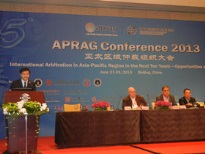
When attending the Greater China Arbitration Forum Conference 2013, BAC’s Vice Chairperson WANG Hongsong delivered a speech themed “How to Improve the Transparency of Arbitration Procedure”, emphasizing on the introduction of BAC’s theoretical accumulation and practical experience in this respect.
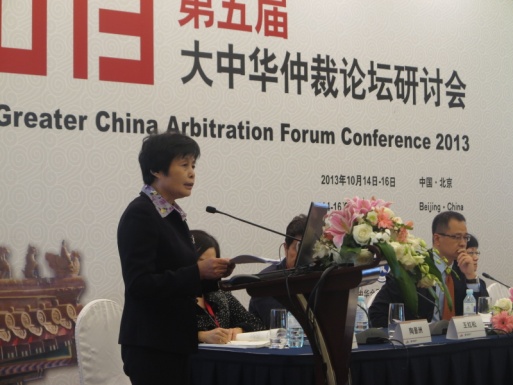
When participating in the International Arbitration Week in Hong Kong, BAC’s Deputy Secretary-General CHEN Fuyong gave lectures on BAC’s Arbitration Rules and practice in the Graduate School, The Chinese University of Hong Kong and the City University of Hong Kong, he also visited The University of Hong Kong, ICC Asia Office, CIETAC Hong Kong Arbitration Center and the Arbitration Chambers Hong Kong.
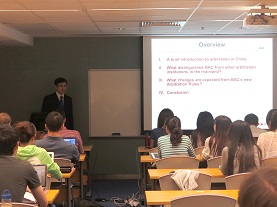
BAC independently or jointly held a total of 9 conferences: the seminar on Latest Developments and Prospects of International Arbitration Rules jointly held with HKIAC; the seminars on “Chinese Intellectual Property: Business Suggestions” and “Where Will China-related Arbitration Go?” jointly held with the China Britain Law Institute, and the Global Arbitration Review made a special report on the latter; the TMT “Arbitration China” seminar jointly held with the SIAC; the seminar on “Disputes Related to Developers and Construction Projects” held by the SIAC with BAC’s support; the “Seminar on Knotty Problems in International Arbitration” jointly held with HKIAC and the Law School of Tsinghua University; the “Seminar on Cost Effectiveness Analysis of International Arbitration and Diversified Competition of International Dispute Resolution Manners”; the seminar on “Drafting Arbitral Awards in International Arbitration” jointly held with the Law School of Tsinghua University; and the International Seminar on Training of Court Competition Skills with BAC’s support. BAC also organized the thanks reception for HKIAC, CIETAC and itself.
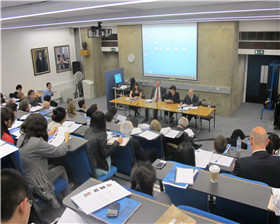
Annual Summit on Commercial Dispute Resolution in China
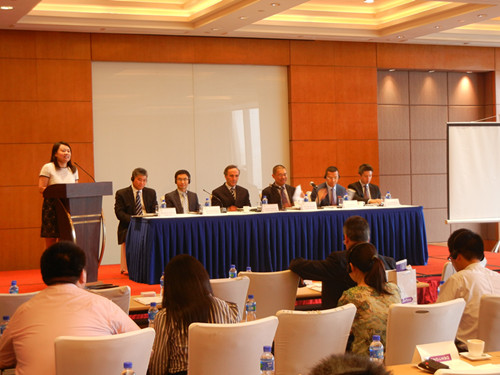
Seminar on Disputes Related to Developers and Construction Projects
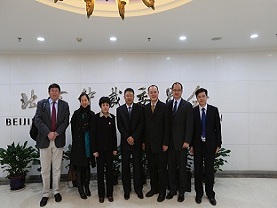
Seminar on International Arbitration Rules
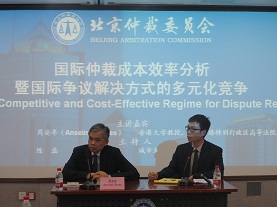
Lecture by Pro. Anselmo Reyes
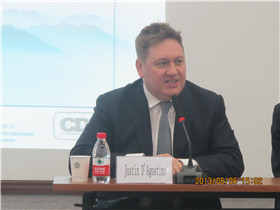
Cooperation with the China Britain Law Institute
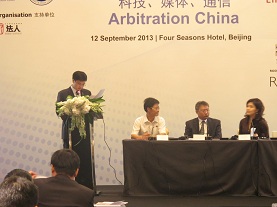
TMT “Arbitration China” Seminar
BAC established cooperation relationship with and provided scholarship to higher education institutions in foreign countries. BAC cooperated with the Pepperdine University, No. 1 university of the USA in the field of dispute resolution, and decided to set up a scholarship in the university so as to enhance BAC’s popularity among international students. 24 applicants of the scholarship from 17 countries have passed the preliminary selection. The publicity of the scholarship has reached 19 dispute resolution organizations, 2 education organizations, more than 900 professors of law/dispute resolution in 22 countries and about 2,500 European practitioners of commercial litigation and commercial arbitration.
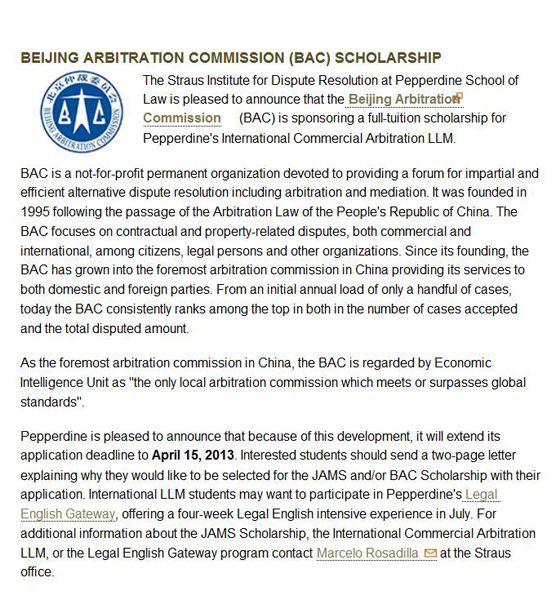
BAC established its Visiting Researchers Program. After receiving a foreign visiting scholar in 2012, BAC established its Visiting Researchers Program. Though two foreign researchers made their applications in 2013, they did not come. Nevertheless, BAC has made its breakthrough in this aspect.
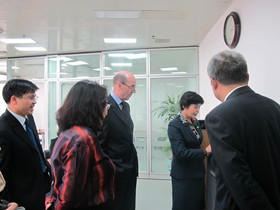
Albert Jan van den Berg, a leading international arbitration expert, visited BAC
BAC improved its International Internship Program, enabling the international interns to play their roles. The major improvements include: A. urging the international interns to decide their research directions by themselves; B. requiring the international interns to have proper Chinese proficiency; C. letting the tutors to choose their interns. By the end of 2013, BAC has enrolled 8 international interns from the Harvard University, the University of California, the University of Washington and the University of Sydney who come from the USA, Australia, Spain and Korea.
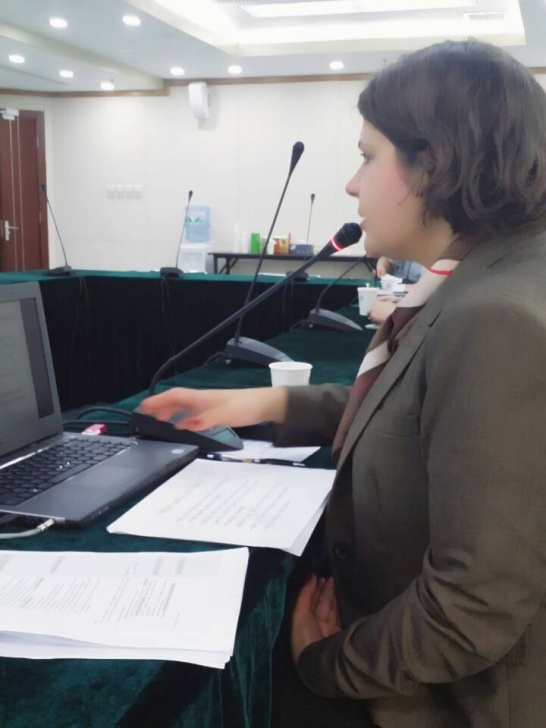
BAC received the visits of experts and scholars from foreign institutions, including representatives of the European Parliament Committee on Legal Affairs, the Law School of the University of Chicago, the Korean Commercial Arbitration Board, the Korean Future Information Property Law Association, MSOD Project Team, SNR DENTON, Clyde & Co Singapore Branch, Wragge & Co and In-House Community. The visitors also include arbitration expert Andrea Kay Bjorklund, leading international arbitration expert Albert Jan van den Berg, US lawyer Malcolm S. McNeil, Pro. Joanna Jemielniak from the University of Copenhagen and Germany’s Financial Ombudsman.
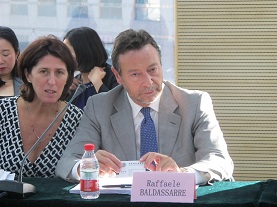
Visit of the European Parliament Committee on Legal Affairs
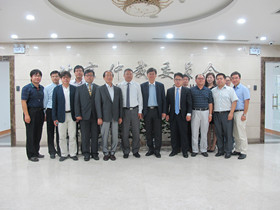
Visit of the Korean Future Information Property Law Association
BAC upgrades from time to time the list of foreign lawyers having cooperation relationship with it, and maintains the contacts with law firms having communication and cooperation with it. At the same time, BAC plans to resume the salon group on international trade and has started the preparation work.
Besides, in order to make preparations for the surge of foreign-related cases brought by the international publicity, BAC carried out some fundamental research work, such as the collection of judicial interpretations on foreign-related businesses, the guiding opinions of different administrative regions and the collection of arbitral awards for foreign-related cases. As China deepens its opening up and attracts more foreign investment, it can be predicted that more disputes related to China-foreign joint ventures and cooperation and foreign investment, BAC should strengthen the research on the relevant theories. BAC plans to sort out the common disputes and problems by the end of 2013, and will make detailed research in the coming years.
VI. Internal Management
(I) Internal working system
With the growth of its institutional framework, BAC improved the division of work for the Secretary-General, the rules of procedure for the Meeting of Secretary-General, and the rules of procedure for the General Office.
(II) Training of secretaries
BAC reconsidered its overall plan for the training of new secretaries in 2013, and decided to provide trainings according to the characteristics of secretaries in different periods. The trainings are generally divided into three phases: the content of Phase I is the general information about BAC and the relevant posts, duties and systems; the content of Phase II includes norms, skills and experience for improving the efficiency and quality of case handling; the content of Phase III includes researches, projects and career planning for self improvement, development and promotion. As there was only one new secretary in BAC who is a case-filing secretary, and considering the reform towards phased and continued training of secretaries, BAC simplified the content of trainings in 2013 and focused on concepts, knowledge and systems. BAC organized 6 trainings for the new secretary in September.
BAC also arranged its secretaries to participate in various professional legal trainings organized by such organizations as the China Law Society and www.lawyertraining.com.cn on financial planning, Internet and e-commerce, insurance law, real estate and disputes related to construction projects.
(III) Enhanced case-filing research and analysis
Firstly, the Case-filing Office carried out the regular analysis and research of its data, completed 9 Work Reports on data statistics and analysis of case types, contract-signing time, locations of the relevant party, cases with large dispute amount and old cases, and carried out horizontal and vertical comparisons, so as to reflect the distribution and development trend of BAC’s case. At the same time, BAC strengthened the notification of case-handling information on group cases, related cases, special cases and special matters, BAC also made public the relevant systems and practices of the Case-filing Office.
Secondly, BAC analyzed the information about major clients. BAC is not classifying and sorting out the data about major clients since its establishment, and will complete the work for clients in the fields of construction and real estate, energy, intellectual property (including screen culture) and financial investment in this month. The specific data will be provided for the use of all business divisions. By the end of 2013, the analysis report on the data of major clients in the field of construction and real estate will be finished under the leadership of WU Wendi and DENG Rui, so as to set the foundation for business expansion in such field in the next year.
Thirdly, BAC adopted the case-filing questionnaire for the relevant parties. BAC began to distribute the questionnaire in the Case-filing Office in March, then made some adjustments to the questionnaire and released the electronic version on its official website in September. By the end of September, BAC received a total of 101 valid feedbacks. BAC made a preliminary analysis of the feedbacks in April and July, and produced an analysis report on all feedbacks at the end of October, which was distributed to both leaders and staff members for their reference, research and use.
Fourthly, BAC carried out an in-depth study on the work orientation of the Case-filing Office. BAC first solicited the opinions of the office’s staff members and the relevant parties, then sorted out these opinions, is now making a preliminary analysis of these opinions in consideration of the office’s specific work, and will solicit the opinions of leaders and other staff members (including case-filing secretaries) on the corresponding adjustment and improvement. By the end of 2013, BAC will clarify and perfect the content, process and specifications of the office’s work, so as to set up a rather sound work system for the office.
(IV) Improved management of interns
From May 2013 to present, BAC has accepted 15 interns from higher education institutions both at home and abroad including Beijing Normal University, China Foreign Affairs University, Peking University, CUPL, People’s University of China, University of International Business and Economics, Beihang University, Chinese Academy of Social Sciences and University of Pittsburgh, including four undergraduates and eleven graduate students.
BAC selected excellent interns according to the relevant provisions, and recommended proper tutors and arbitrators for them. BAC obtained the demand of secretaries for interns in advance, and allocated the interns according to such demand, achieving good effect. At the same time, BAC formulated such documents as the Guides for Interns, the Instructions for Interns, the Intern Assessment Form and the Intern Feedback Form for the reference and use of the secretaries and interns, and timely solicited their opinions and suggestions.
VII. Work in 2014
Under the leadership of five committees, BAC made brilliant achievements in the past 18 years, and has formed good work systems, mechanisms and culture. The new committee and all staff members of BAC must stick to and carry forward the proven traditions. BAC’s general principle for the work in 2013 is to set a solid foundation for smooth transition, which was fundamentally realized after a year’s efforts. We achieved good results in the arbitration business and other dispute resolution businesses, we had clearer ideas for research, publicity and other work, and our office staff was more enthusiastic and initiative. In 2014, setting foundation will remain to be our core work, and we will try to make breakthroughs in some key areas.
(I) To remain the focus on case-handling quality
Firstly, we will stick to the effective arbitration case handling mechanisms, and earnestly ensure the independent case-handling of arbitration tribunals and arbitrators.
Secondly, we will strengthen the communication on procedures, so as to improve case-handling efficiency and decrease pending cases.
Thirdly, we will take Arbitrators’ Salons and the Excellent Arbitral Awards Selection as the breakthrough points for the exchange of case-handling experience, so as to improve the quality of arbitral awards.
Fourthly, we will make a comprehensive introduction, publicity and promotion of our modification to the Arbitration Rules in the whole arbitration circle, so as to help arbitrators, the relevant parties and agents comprehend the new rules and enhance BAC’s influence.
(II) To further develop the existing research and publicity brands
In 2014, BAC will continue some routine work, such as the arbitrators training, the Beijing Arbitration Quarterly, the BAC Book Collections program, arbitrators’ salons, the BAC Newsletter, the Commercial Law, the new lawyer training program, the International Internship Program, the BAC Scholarship in higher education institutions of foreign countries, the Visiting Research Program, the communication and exchange with the courts, the BAC Cup contest of articles, and the collection of arbitral awards and cases in some professional fields.
The brands need to be improved and developed include the Progress Report on the Rule of Law, the Scientific Research Fund, the BAC Book Collections, the BAC Translation Series, the Forum on Practice of In-house Counsels, the Forum on Practice of Financial Law.
At present, BAC’s research and publicity are in full swing. BAC has found certain methods and approaches, and will carry out more diversified research and publicity activities in the next year. However, the personnel of the General Office are limited, so BAC calls on its arbitrators to integrate their resources, so as to improve the depth and range of BAC’s research and publicity by multiple forms such as seminars, trainings and conferences.
(III) To intensify the internal construction and improve the service level
In order to earnest improve our service level, BAC’s General Office put forward 85 suggestions in 2013 for improving BAC’s work based on the comprehensive solicitation of opinions. These suggestions were divided into three categories for implementation: for problems caused by ineffective execution of job specifications, the rectification shall be made immediately; for problems to be solved by improving job skills and clarifying job duties, the pointed measures such as special trainings shall be taken for the rapid solution; for institutional problems with overall importance, the further study shall be initiated to clear the ideas and determine the reform plan, so as to solve these problems through the improvement of systems and mechanisms.
The key tasks in 2014 are as follows: first, we will clarify and improve the work systems of the General Office; second, we will strengthen the team building and establish a scientific management system so as to cultivate talents for BAC’s sustainable development, and we will employ a third-party research institution to work out BAC’s overall human resource plan; thirdly, we will further update the current case-handling information system.